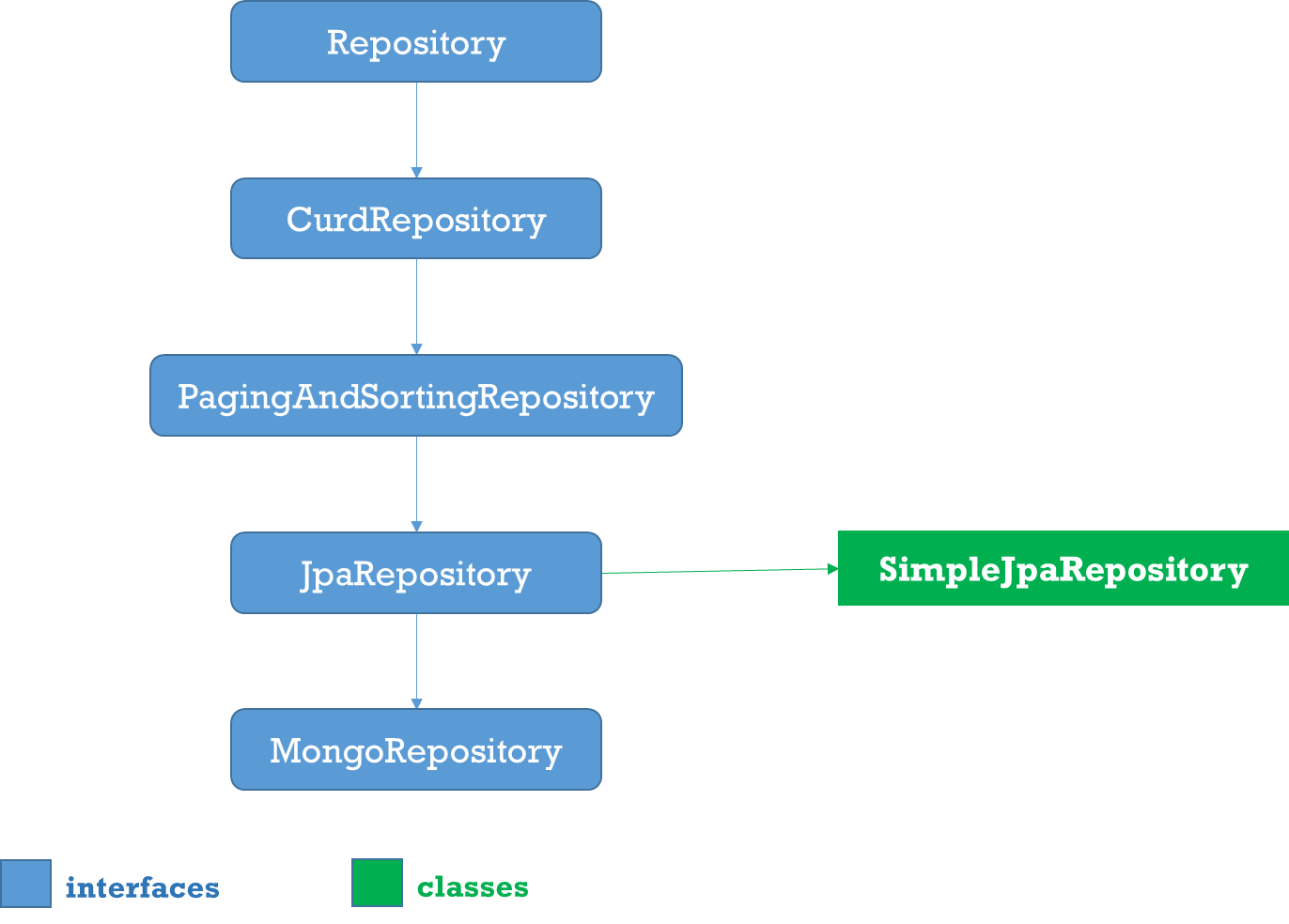Spring 4 Enhancement – Spring Data Commons
Spring Data Commons provides all the common abstractions that enable you to connect with different data stores.
Spring Data Coomons provides classes & methods, which are common for all the SQL, NoSQL, BigData databases
The Spring Data Commons project provides general infrastructure and interfaces for the other, more specific data projects. Regardless of the type of datastore, Spring Data supports the following aspects with a single API:
-
Execute CRUD (create, read, update, delete) operations
-
Sorting
-
Page-wise reading (pagination)

1.Repositoy
Root interface for all Repositoty classes. It is a marker interface(no methods)
2.CurdRepositoy
It provides generic CRUD operations irrespective of the underlying database. It extends Repository interface.
public interface CrudRepository<T, ID> extends Repository<T, ID> {
save(S entity);
saveAll(Iterable<S> entities);
Optional<T> findById(ID id);
Iterable<T> findAll();
Iterable<T> findAllById(Iterable<ID> ids);
void deleteById(ID id);
void delete(T entity);
void deleteAll(Iterable<? extends T> entities);
void deleteAll();
boolean existsById(ID id);
long count();
}
3.PagingAndSortingRepository
PagingAndSortingRepository provides options to
-
Sort your data using Sort interface
-
Paginate your data using Pageable interface, which provides methods for pagination - getPageNumber(), getPageSize(), next(), previousOrFirst() etc
public abstract interface PagingAndSortingRepository extends CrudRepository { public Iterable findAll(Sort sort); public Page findAll(Pageable pageable); }
4.JpaRepository
JPA specific extension of Repository
public interface JpaRepository<T, ID extends Serializable> extends
PagingAndSortingRepository<T, ID> {
List<T> findAll();
List<T> findAll(Sort sort);
List<T> save(Iterable<? extends T> entities);
void flush();
T saveAndFlush(T entity);
void deleteInBatch(Iterable<T> entities);
}
5.MongoRepository
Mongo specific Repository interface.
public interface MongoRepository<T, ID> extends PagingAndSortingRepository {
List<T> findAll()
List<T> findAll(Sort sort)
List<S> saveAll(Iterable<S> entities)
List<S> insert(Iterable<S> entities)
S insert(S entity)
}
6.Custom Repository
-
You can create a custom repository extending any of the repository classes - Repository, PagingAndSortingRepository or CrudRepository. For example,
interface PersonRepository extends CrudRepository<User, Long> { } -
Spring Data also provides the feature of query creation from interface method names.
interface PersonRepository extends Repository<User, Long> {
List<Person> findByEmailAddressAndLastname(EmailAddress emailAddress, String lastname);
// Enables the distinct flag for the query
List<Person> findDistinctPeopleByLastnameOrFirstname(String lastname, String firstname);
List<Person> findPeopleDistinctByLastnameOrFirstname(String lastname, String firstname);
// Enabling ignoring case for an individual property
List<Person> findByLastnameIgnoreCase(String lastname);
// Enabling ignoring case for all suitable properties
List<Person> findByLastnameAndFirstnameAllIgnoreCase(String lastname, String firstname);
// Enabling static ORDER BY for a query
List<Person> findByLastnameOrderByFirstnameAsc(String lastname);
List<Person> findByLastnameOrderByFirstnameDesc(String lastname);
}
7.Defining Query Methods
The repository proxy has two ways to derive a store-specific query from the method name:
-
By deriving the query from the method name directly.
List<Person> findByEmailAddressAndLastname(EmailAddress emailAddress, String lastname); -
By using a manually defined query.
@Query("select u from User u") List<User> findAllByCustomQueryAndStream(); -
Limiting the result size of a query with Top and First
User findFirstByOrderByLastnameAsc(); User findTopByOrderByAgeDesc(); Page<User> queryFirst10ByLastname(String lastname, Pageable pageable); Slice<User> findTop3ByLastname(String lastname, Pageable pageable); List<User> findFirst10ByLastname(String lastname, Sort sort); List<User> findTop10ByLastname(String lastname, Pageable pageable);